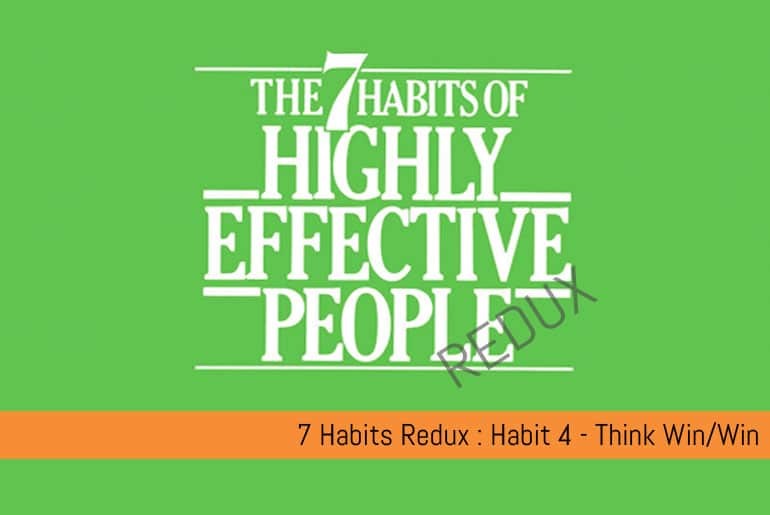The 7 Habits of Highly Effective People Redux: Habit 4 – Think Win/Win
In order to achieve a mutually beneficial outcome to any situation, we need to go into it with a “Win/Win” attitude. This means that both parties get what they want, but more importantly, we build a relationship with the other party that can be useful later on.

With Habit 4 we move into the “Public Victory Phase”, this is where we begin to act and interact with others to achieve not only our own goals but those of others too. This move towards helping others takes us from independence to interdependence – helping others helps us help ourselves. We can only master the fourth habit once we have become independent through mastering habits 1, 2 and 3.
Before Covey gets into the nuts and bolts of Habit 4, he asks us firstly to understand the concept of an “Emotional Bank Account”. I’m sure you understand the concept of a financial bank account: You pay money in to get in credit, take out too much money and you become overdrawn.
With each person we deal with, with have an “Emotional Bank Account” (E.B.A). If I’m nice to you, I build up credit. If I’m nasty I make a withdrawal on the goodwill (credit) I’ve built up.
According to Covey, there are six ways you can make “major” deposits into a person’s E.B.A:
- Understanding the person
- Taking note of “the little things”
- Keeping commitments
- Clarifying expectations
- Showing personal integrity
- Apologising when you make an E.B.A withdrawal – and meaning it
Once you understand the concept of the E.B.A – how actions and reactions have a direct impact on your relationships with others – you can move onto the “Public Victory” Habits.
With Habit 4, we learn to recognise that cooperation is key, and we can only co-operate fully with people if we have sufficient E.B.A credits.
Covey states that there are 6 outcomes in the way that we interact and resolve issues with people:
- Win / Win
- Win / Lose
- Lose / Win
- Lose / Lose
- Win
- Win / Win or No Deal
Obviously, Win/Win is the best outcome for all involved but a lot of the time we’re conditioned to want a Win / Lose outcome as we all love to come out on top. This outcome, however, takes a heavy toll on the credits in our E.B.A.
Need a bit more advice on this subject? Check out these books
Technically, the best possible outcome will depend on the situation you’re in. Sometimes a more effective outcome will actually be Lose / Win so that the other person feel as though they have come out on top, this then increases your credits in their E.B.A.
In order to achieve Win / Win, there are some important aspects that need to be brought into play:
- Character – Integrity, Maturity and Abundance Mentality. We stick to out values in a mature manner and realise that everyone can have a piece if the same pie.
- Relationships. Building up our E.B.A so we’re a credible person to deal with and can bring the person into our circle of influence.
- Agreements. Everyone needs to feel happy with the outcome or it becomes a “Lose” or “No deal” situation.
Alongside these aspects, we need to have a system in place that rewards Win/Win scenarios rather than other outcomes. For example there’s no point putting a bonus structure in place that rewards people for stomping all over their co-workers to achieve sales targets, that just fosters a Win/Lose mentality. You need to focus on a system with rewards co-operation and therefore breeds a Win/Win environment.
View The Other Posts In The Series
- 7 Habits : An Overview
- 7 Habits: Habit 1 – Be Proactive
- 7 Habits: Habit 2 – Start with the end in mind
- 7 Habits: Habit 3 – Put first things first
- 7 Habits: Habit 4 – Think Win/Win
- 7 Habits: Habit 5 – Seek first to understand then to be understood
- 7 Habits: Habit 6 – Synergise
- 7 Habits: Habit 7 – Sharpen The Saw : Principles of balanced Self-Renewal
Why Not Read The Updated Version?
- The 7 Habits of Highly Effective People Redux : Overview
- The 7 Habits of Highly Effective People Redux: Habit 1 – Be Proactive
- The 7 Habits of Highly Effective People Redux: Habit 2 – Begin with the end in mind
- The 7 Habits of Highly Effective People Redux: Habit 3 – Put First Things First
- The 7 Habits of Highly Effective People Redux: Habit 5 – Seek first to understand then to be understood
- The 7 Habits of Highly Effective People Redux: Habit 6 – Synergize
- The 7 Habits of Highly Effective People Redux: Habit 7 – Sharpen The Saw

